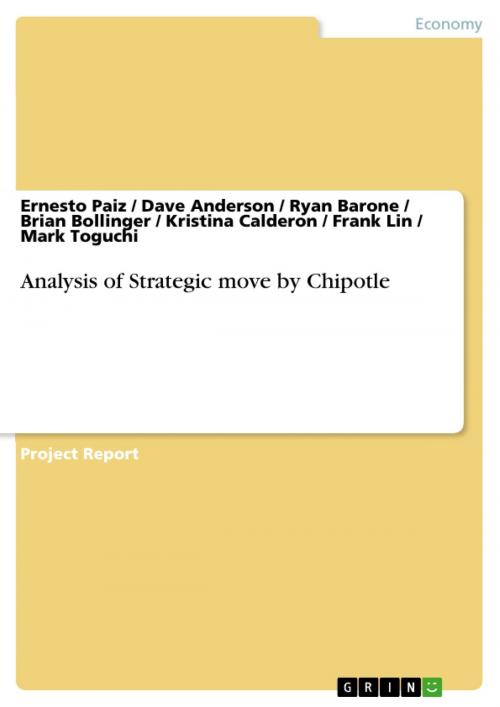Analysis of Strategic move by Chipotle
Business & Finance, Entrepreneurship & Small Business, New Business Enterprises| Author: | Ernesto Paiz, Dave Anderson, Ryan Barone, Brian Bollinger, Kristina Calderon, Frank Lin, Mark Toguch | ISBN: | 9783640931934 |
| Publisher: | GRIN Publishing | Publication: | June 6, 2011 |
| Imprint: | GRIN Publishing | Language: | English |
| Author: | Ernesto Paiz, Dave Anderson, Ryan Barone, Brian Bollinger, Kristina Calderon, Frank Lin, Mark Toguch |
| ISBN: | 9783640931934 |
| Publisher: | GRIN Publishing |
| Publication: | June 6, 2011 |
| Imprint: | GRIN Publishing |
| Language: | English |
Project Report from the year 2011 in the subject Business economics - Company formation, Business Plans, grade: B, Santa Clara University, language: English, abstract: Chipotle Mexican Grill, hereafter referred to as Chipotle, is a fast-casual restaurant that specializes in a limited menu mainly consisting of burritos, tacos and burrito bowls. Chipotle is known for its ability to offer products made from sustainable, organic ingredients, while remaining price competitive with other fast food chains. Chipotle refers to this differentiation as 'food with integrity' and it is the driving force that has propelled the company to where it is today. Since its foundation in 1993, Chipotle has been tremendously successful, growing into a corporation that is now worth roughly $8.5 billion (56). Chipotle's growth is a direct result of the quality of its products, the consistency of its service and the perceived differentiated value it has established in the minds of consumers. Chipotle stands apart from others in a highly concentrated industry because it does business differently in terms of its food, restaurants and advertising. While most fast food chains rely on advertisements that promote menu gimmicks, such as limited-time price reductions, new items, value menu offerings and more, Chipotle focuses on showcasing its quality ingredients. It also generates excitement for its food through a number promotional events and word of mouth. Strategic Move Even though the restaurant and bar industry is saturated, there are not many competitors that offer organic ingredients within the industry. To take advantage of the recent surge of consumers who demand healthier, organic food, Chipotle has decided to enter into the fast-casual Asian restaurant market with a new chain named ShopHouse Southeast Asian Kitchen, hereafter referred to as ShopHouse. Staying true to its position as a focused differentiator, Chipotle will operate ShopHouse under the same philosophy that has made it so successful, offering sustainable gourmet ingredients at reasonable prices.
Project Report from the year 2011 in the subject Business economics - Company formation, Business Plans, grade: B, Santa Clara University, language: English, abstract: Chipotle Mexican Grill, hereafter referred to as Chipotle, is a fast-casual restaurant that specializes in a limited menu mainly consisting of burritos, tacos and burrito bowls. Chipotle is known for its ability to offer products made from sustainable, organic ingredients, while remaining price competitive with other fast food chains. Chipotle refers to this differentiation as 'food with integrity' and it is the driving force that has propelled the company to where it is today. Since its foundation in 1993, Chipotle has been tremendously successful, growing into a corporation that is now worth roughly $8.5 billion (56). Chipotle's growth is a direct result of the quality of its products, the consistency of its service and the perceived differentiated value it has established in the minds of consumers. Chipotle stands apart from others in a highly concentrated industry because it does business differently in terms of its food, restaurants and advertising. While most fast food chains rely on advertisements that promote menu gimmicks, such as limited-time price reductions, new items, value menu offerings and more, Chipotle focuses on showcasing its quality ingredients. It also generates excitement for its food through a number promotional events and word of mouth. Strategic Move Even though the restaurant and bar industry is saturated, there are not many competitors that offer organic ingredients within the industry. To take advantage of the recent surge of consumers who demand healthier, organic food, Chipotle has decided to enter into the fast-casual Asian restaurant market with a new chain named ShopHouse Southeast Asian Kitchen, hereafter referred to as ShopHouse. Staying true to its position as a focused differentiator, Chipotle will operate ShopHouse under the same philosophy that has made it so successful, offering sustainable gourmet ingredients at reasonable prices.















